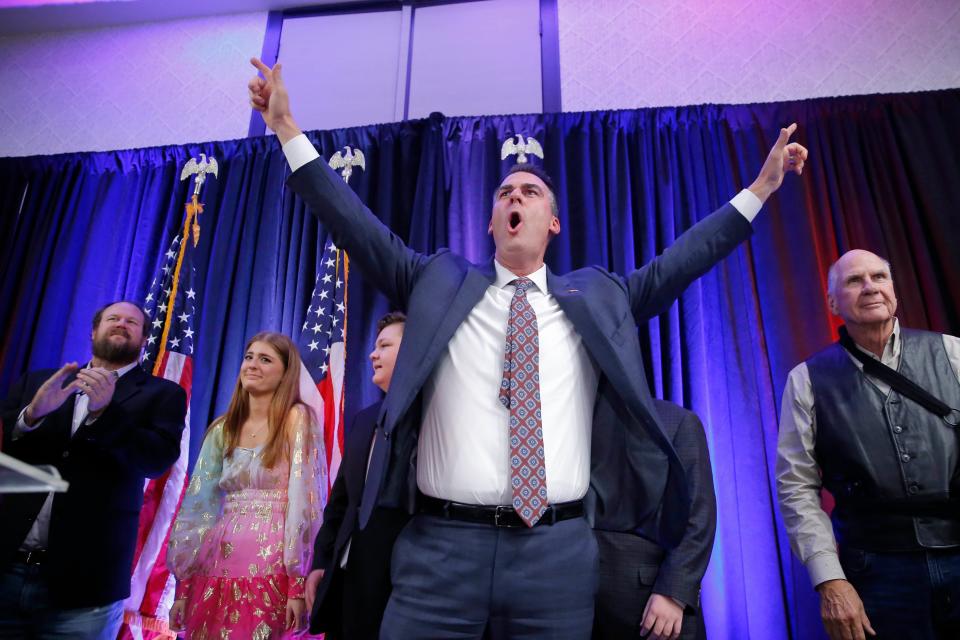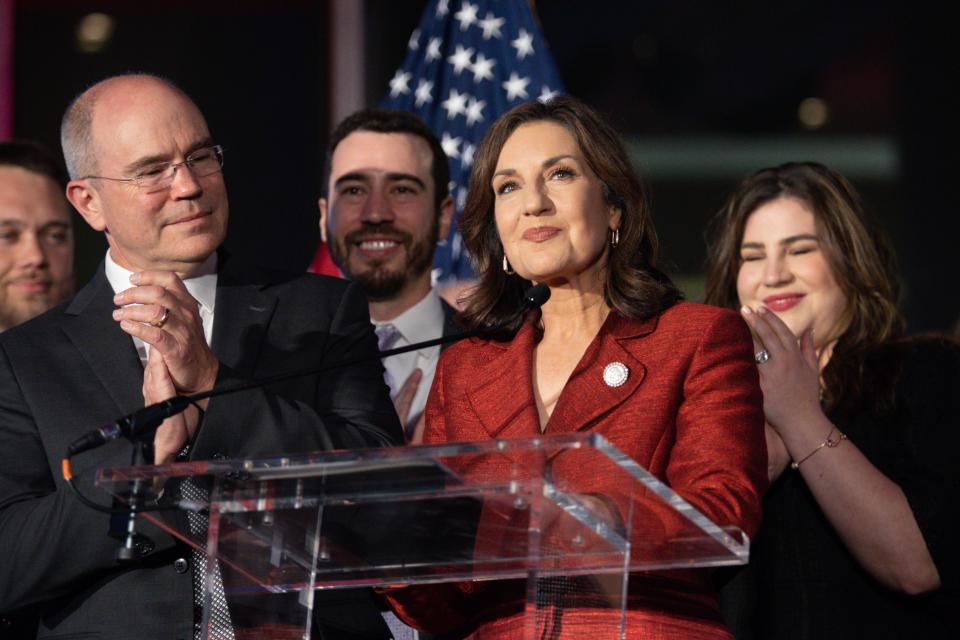After reelection win, Stitt targets schools and 'more options' for parents
- Oops!Something went wrong.Please try again later.
- Oops!Something went wrong.Please try again later.
A day after his commanding reelection victory, Gov. Kevin Stitt said his focus was on "continuing the momentum" of the last four years, along with increasing efforts to improve Oklahoma's schools.
Stitt, 49, beat his Democratic challenger by nearly 14 percentage points, a bigger margin than his 2018 election when he rose from political obscurity to beat several well-known Oklahoma politicians — a sitting lieutenant governor, a former attorney general and the mayor of the state’s largest city.
On Tuesday he beat another established politician in Joy Hofmeister, who for eight years had served as the state’s superintendent of public instruction.
"Oklahomans stated loud and clear today they are proud of how far we have come," Stitt said Tuesday evening from his watch party in northwest Oklahoma City.

Stitt received 55% of the more than 1.1 million ballots cast. Hofmeister finished with 42%, followed by Libertarian Natalie Bruno and independent Ervin Yen, who both finished below 2%, according to unofficial results from the Oklahoma State Election Board.
More:Ryan Walters elected as Oklahoma's next schools superintendent
Stitt's campaign cry was to make Oklahoma a “Top 10” state in virtually every metric, including education, which he said had suffered under Hofmeister's leadership.
Ryan Walters, Stitt's education secretary, also won big Tuesday in his race for state superintendent of public instruction, putting a Stitt ally ahead of the Oklahoma State Department of Education, an agency the governor consistently criticized, especially after Hofmeister launched a campaign against him.
"We want to relook at education and give parents more options," Stitt said Wednesday morning during a television interview.
It was a continuation of his election night victory speech when he spoke about empowering families to choose their own school, including through the use of vouchers that allow students to access tax dollars to pay for private school tuition.

Hofmeister made opposition to vouchers a central part of her campaign, claiming it would be a “rural school killer.”
Even Republican leaders in the state House said they were unsupportive of the idea, and a school voucher bill was narrowly defeated this year in the state Senate.
But while the dynamics in the state Legislature, especially in the House, have not significantly changed, Stitt is likely to use his reelection as a mandate to try again next year.
We are going to "make sure that every child has access to a quality education, regardless of their ZIP code or their financial resources," Stitt said Tuesday. "This means protecting our rural schools and unlocking opportunities for families that are stuck in failing districts."
Stitt names new chief of staff
A day after his reelection, Stitt's office announced its first staffing change with Brandon Tatum named chief of staff, succeeding Bond Payne, who announced his departure months ago.
Tatum is an executive at Oklahoma Christian University, experience the governor said would come in handy, especially when it comes to creating partnerships between schools and the private sector.
“Brandon is an overachiever who brings the right temperament and personality to lead our team,” Stitt said in a Wednesday statement.
Hofmeister switched parties to take on Stitt

A Republican her entire political career, Hofmeister defected to the Democratic Party last year, less as an embrace of progressive policies and instead as an easier path to the governor’s office by avoiding a primary where Stitt would no doubt have the advantage.
Hofmeister called for a return to political moderation, rejecting Stitt’s partisan rhetoric that had seemed to intensify in recent years.
Speaking to supporters Tuesday night after she had conceded, Hofmeister repeated her call for bipartisanship.
"We have planted seeds all across this state to get back to a place of civility, back to a place where we unite,” Hofmeister said from inside the Oklahoma History Center.
More:Who won? Your guide to Oklahoma 2022 election results
Oklahoma’s gubernatorial race drew rare national attention in the closing weeks as some polls showed a tight contest, leading multiple election tracking sites to label the state a “toss-up," or at least within striking distance for Hofmeister.
Stitt’s campaign consistently downplayed the close polls, claiming he was leading by a large margin.
However, Stitt appeared to believe the race was tightening as he intensified his travel across the state, loaned his reelection effort $2 million and welcomed some Republican heavy hitters to come stump on his behalf.
The Republican Governors Association and other national groups also began spending money on pro-Stitt ads, an attempt to counter more than $14 million in "dark-money" attacks the governor faced over the last several months.
While Stitt presented himself as an outsider, Hofmeister accused him of being corrupt and a bully.
She highlighted recent financial scandals under his watch, including no-bid contracts awarded for restaurants at state parks and the use of pandemic relief funds that a federal audit said were improperly managed.
She also rebuked Stitt's public spats with some of Oklahoma's largest tribal governments, first over casino fees and later matters of tribal sovereignty.
In response, several tribal leaders endorsed Hofmeister.
“She wants to unite people, she does not look to divide us," said Choctaw Nation Chief Gary Batton.
Backlash to state's abortion ban did not emerge
Another consistent attack from Hofmeister was over Stitt's signing of a nearly complete ban on all abortion procedures, tapping into an issue that had energized Democrats this summer after the U.S. Supreme Court overturned Roe. v. Wade.
Voters in Kansas, Oklahoma’s neighbor to the north and another Republican stronghold, voted this year to preserve abortion rights, which sent shockwaves throughout red America.
Some Republican women threw their support behind Hofmeister, claiming Stitt’s rejection of abortion rights had troubled them.
“This has been a very alarming year realizing that my life doesn't matter to a lot of people,” said Brea Mulholland, a lifelong Republican from El Reno who supported Hofmeister because of her stance on abortion rights.
More:Oklahoma Republicans sweep statewide races
The governor remained largely committed to his anti-abortion pledge during the campaign, but during a debate, he appeared to acknowledge that the recent ban may have gone too far and said if the state Legislature sent him a revised bill that allowed abortions in cases of rape or incest he would sign it.
But those perceived political headwinds did not diminish his electability.
Juan Frausto, of Oklahoma City, said he voted for Stitt and was proud of him for supporting all anti-abortion laws.
"Life begins at life," Frausto said from Stitt's watch party. "We should value life."
This article originally appeared on Oklahoman: Kevin Stitt looks ahead to next four years after reelection

